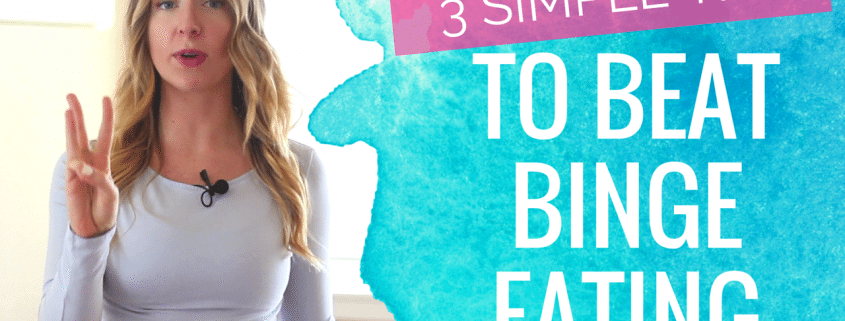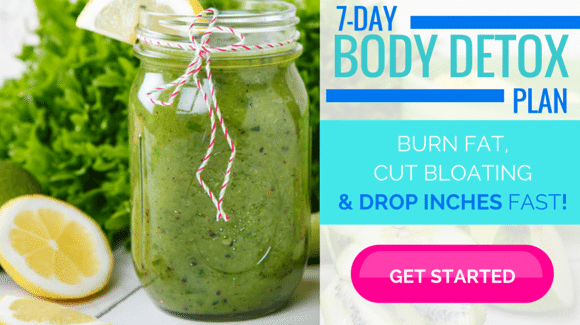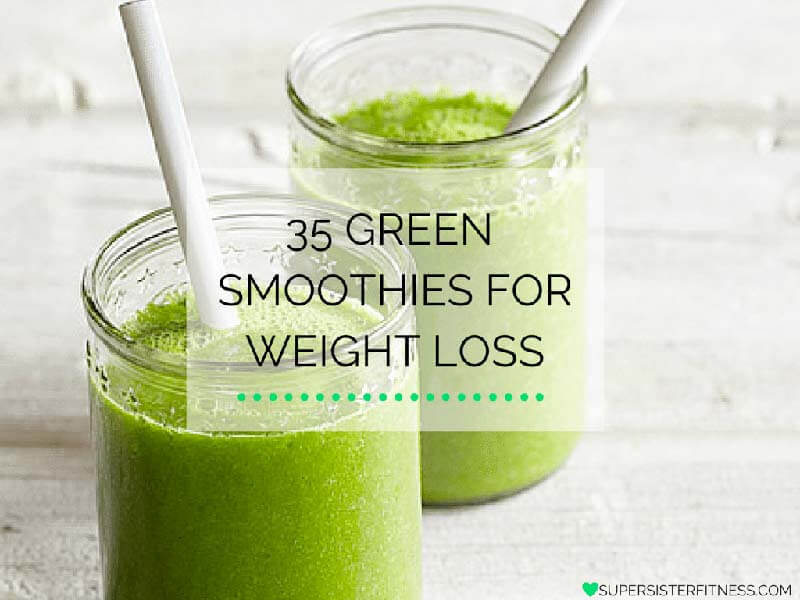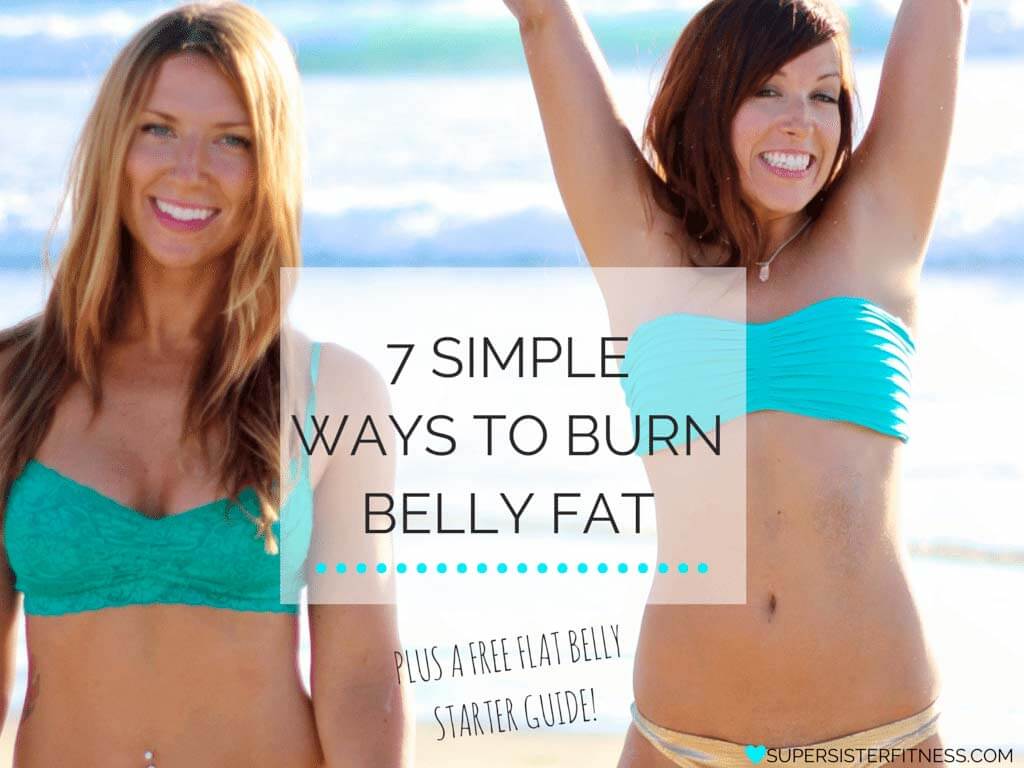Beat the Binge | Binge Eating Help
How to Overcome binge eating FOR GOOD
Binge eating…
In fact, 2/3 of women struggle with some kind of eating related disorder at some point in their lives.
3 Simple Steps To Beat The Binge
Tip #1: Stop Calorie Counting
When you focus on only eating a certain amount of calories per day, you are restricting your caloric intake. Bottom line: this cycle of deprivation is bound to backfire at some point.
In other words, most people can only control something for so long before it bites ya in the ass… And usually it comes in the form of a full blown binge – cookies, pizza, chips, cake, chocolate – or whatever else you can get your hands on.
In our experience, binge eating typically occurs when a person experiences real or perceived food deprivation and/or an overarching “restriction mentality” when it comes to food choices.
Counting calories can encourage binge eating, because it’s almost like saying “I am restricting myself to only eat 1200 calories per day, or else I’ve failed. And if I fail, well, then might as well go big or go home…”
Binge fest ensues, because you think to yourself, “Well I totally blew my diet today, and now that I’ve had 1 cookie I might as well eat the whole box then order a pizza and finish it off with a fudge sundae. Then I’ll start fresh tomorrow”
Not only that, one of the major flaws in the calorie counting diet method is that a calorie gives you no idea about the quality of the nutrition you are eating.
Could you eat donuts all day and still stay within your allocated number of daily calories?
Of course.
But, would you feel like crap and probably have no energy?
Definitely.
So this brings us to Tip #2…
Tip #2: Eat Real Food
Instead of focusing on the quantity (i.e. counting calories), focus on the quality of your food – nutrients!
By focusing on the quality of nutrition, you don’t need to calorie count or worry about enjoying an occasional donut. You can enjoy food the way it was meant to be, not as a numbers game or something you need to control.
Basically, by focusing on eating real food – fresh fruits, vegetables, leafy greens, nuts & seeds, legumes, etc – you provide your body with the nutrition it needs and you “crowd out” the other not-so-healthy stuff without even having to think about it.
More often than not, your cravings for sweets and carb heavy foods are due to a lack of nutrition. Your body is missing some kind of vitamin or mineral that you aren’t getting in your diet so it comes off as a craving for something that will give you energy in the short term (usually sugary sweets and simple carbohydrates).
If you change your focus to quality of nutrition, you will lose weight effortlessly without counting a single morsel of food that goes into your mouth.
Oh, and you may have heard this one before… Think fruit has “too much” sugar?
Think again.
Why? Because that’s a myth created by the bodybuilding industry for competitive athletes to lean down in their last weeks before showtime.
For everyday non-competition people, it doesn’t make sense to limit your intake of the superior nutrition you receive from fruit unless you’ve been instructed to do so by a medical professional.
In spite of the long-running history of fruit being a main staple in the human diet, the condemning of fruit as having “too much sugar” has recently come to the forefront of the diet and health industry.
Indeed, too much sugar is bad for you, but it is nearly impossible to get that sugar overload from fresh, natural plant-based sources such as fruit.
That’s because not all sugar is created equal.
Here’s the thing… your body processes natural sugars from fruit completely different than a refined, processed white sugar from baked goods, breads, pastries and/or cookies.
Since natural sugar from fruit is delivered as one part of a nutritionally dense package that also includes water, fiber, and an enormous variety of vitamins, minerals, antioxidants, and electrolytes, it does not spike your blood sugar like traditional white sugar does.
The problem of “too much sugar” comes from that corresponding spike in blood sugar, which over time can lead to a host of problems including diabetes and insulin insensitivity.
But most fruit is actually lower on the glycemic index than starchy carbohydrates like bread and baked goods.
This means your body has less of an insulin response to fruits, making them a great healthy food option you can eat regularly, without worry that you’re eating “too much sugar.”
Fruit is not responsible for holding you back from your weight loss goals. In fact, in general, more fruit typically helps people reach goals faster since it helps most people stave off sugary sweets cravings and is a great natural source of many macro & micronutrients which help the body function optimally.
So feel free to eat your fruit often and in abundance, without worry, and keep in mind it’s the ultimate healthy “grab & go” snack if you’re running short on time!
Bottom line: focusing on nutrient density over calorie restriction will make you feel good and look good too.
Tip #3: Stop Eating Artificial Sweeteners!
Artificial sweeteners and fake sugars promote fat storage, stimulate appetite, AND increase carb cravings, making it nearly impossible to lose weight and keep it off.
This unfortunate combination of side effects can also put you on the fast track to binge town.
How? Well, think about it…
The human body is a complex system made up of organs, muscles, tissues, cells, and more. And, it has no way of knowing the difference between real sugar and fake sugar.
When you eat artificial sweetener, your brain gets the signal that you’re eating something sweet.
So, your brain anticipates a healthy dose of energy (in the form of carbohydrates) to accompany that sweet taste. But, since artificial sweetener doesn’t have any calories, your body doesn’t receive the energy it’s expecting.
So this leaves your brain in a “voided” state, where it ends up craving sugary sweets and simple carbohydrates more.
Which encourages you to eat even more.
In fact, those who drank 2 or more diet sodas per day had 500% larger waistlines than their non-soda drinking counterparts.
500%!!!!!!!
5 Reasons Fake Sugar is Making You Fat
- It keeps you hungry – MRIs have shown that the appetite suppression brought about by real sugar doesn’t happen with artificial sweeteners, even if they contain calories. So if you eat something with aspartame, chances are you’ll still feel hungry afterwards.
- It prevents you from knowing when you’ve eaten enough – Because it interferes with leptin, the “satiety hormone” made by fat cells which regulates fat storage in the body, aspartame interferes with your body’s ability to know when you’ve had enough. This can lead you to eat more than necessary, increasing your likelihood of gaining or holding onto extra body fat.
- It increases your appetite – Anything that tastes sweet increases appetite. It’s just the way our bodies are wired. Your best bet is to steer clear of sweets in general, but if you can’t, you’re better off just eating real sugar. Real sugar at least causes your body to send signals when it’s time to stop — something that fake sugar does not.
- Makes you crave more sweets – Repeated exposure to sweets makes you crave more sweets, regardless of what is creating the sweet taste. It’s a vicious cycle that you don’t want to be trapped in. Our neurochemistry actually changes to cause the body to have stronger, more frequent cravings when eating sweets regularly. Try phasing them out or avoiding them 90% of the time and your body will rebalance itself in a matter of weeks.
- Deranges fat storage – Aspartame, one type of fake sugar, contains phenylalanine and aspartate, two chemicals that interfere with insulin and leptin. Insulin and leptin dictate how fat is handled and stored in the body. In order to maintain a lean, healthy physique, you want minimal interference with insulin and leptin. To let them do their jobs efficiently, you’ve gotta cut out the interference.
And the scary part is that these are just a few of the many other risk factors associated with fake sweetener consumption.
Be sure to watch out for fake sugar in:
- Chewing gum
- Flavored or “enhanced” waters
- Stevia packets (i.e. Truvia, Purevia, etc. — always check the ingredients — lots still contain dextrose)
- Sugar-free products
- “Diet” products
- Protein bars
So there you have it…
I can tell you firsthand from my own experience that these 3 simple steps – not calorie counting, eating real food, and cutting out fake sugar – were THE most important things I discovered while overcoming my own binge eating disorder.
I struggled with this disorder for over 4 years. That’s time I can’t get back, but if at least ONE person is able to find this information useful, then I will know that the turbulent emotional highs & lows I went through during that time had a purpose.
Whatever is going on in your life right now, I want you to know that you are beautiful the way God created you.
You are worthy of love. You are NOT just valued based on your appearance. You can literally do anything you want to do in your life.
You can overcome this struggle.
You are strong. You are smart. You are perfect exactly how you are, even if you can’t quite see it right now because of whatever seeds the media has planted in your head about how you “should” look or be in the world.
And I really mean all of that from the bottom of my heart.
If there is any way I can help you at all, please let me know. I am always here for support or to answer any questions that I can, and I’ve turned this struggle into a story meant to inspire other women to learn how to do the same.
xoxo,
Sara









